Beneath the blazing summer sun on a former slave plantation, Lamont Gross and fellow prisoners stooped in long rows, picking vegetables by hand under the watchful eyes of armed guards on horseback. He said breaks were short and infrequent, with nothing to protect workers from the heat.
“I saw guys collapse,” Gross said of his days on the so-called farm line at Louisiana’s state penitentiary, where men work for pennies an hour or nothing at all and face punishment if they refuse. “There were dudes that got heat stroke. There were dudes with underlying conditions, older or had some sort of disability, but they had to go out there, too.”
As daily temperatures hit record highs across much of the South, a federal judge took an unusual step, challenging the treatment of mostly Black incarcerated workers in the fields.
America’s largest maximum-security prison, known as Angola, sits on 18,000 acres. It was once a patchwork of cotton fields where, historians note, even enslaved pregnant women and young children worked from dawn to dusk during the busiest and hottest harvesting months. Prisoners have toiled on the same farm lines since after emancipation often without shade, adequate work breaks or even sunscreen.
In September, several incarcerated workers along with the New Orleans-based advocacy group Voice of the Experienced filed a class-action lawsuit calling for an end to the farm line, and accusing the state of cruel and unusual punishment. But as temperatures soared in May, the men asked the court in an emergency filing to stop work during extreme heat.
U.S. District Judge Brian Jackson issued a temporary restraining order earlier this month. It said correctional officials have shown “deliberate indifference” to the risks of injuries or death of incarcerated workers in sending them to the fields even when they had serious health issues, including some with heart disease, high blood pressure and histories of pre-diabetes or AIDS.
He ordered the state to quickly fix what he called “glaring deficiencies” in its heat-related policies.
Louisiana’s corrections department challenged the order, but the 5th Circuit Court of Appeals sided with the judge. Prison officials have already taken some steps to improve conditions, providing inmates with sunscreen and pop-up tents for shade, lawyers for the state said. And when heat alerts are issued, which is common in summer months, they have agreed to provide the men with five-minute breaks every half hour.
Earlier, the state warned that shutting down the farm line once the heat index hits 88 degrees Fahrenheit (31.1 degrees Celsius), as requested by plaintiffs in their emergency filing, would “open the floodgates” to cease work “in any institution across the South.”
Several other Southern states also operate sprawling penal farms on former slave plantations. Modern equipment is typically used to tend and harvest row crops that are sometimes sold on the open market and exported, even though the U.S. bans the import of goods made with prison labor overseas. But in some places, like Louisiana’s penitentiary, rudimentary tools and prisoners’ bare hands are used to harvest fruits and vegetables that feed inmates.
“If we can get similar rulings here in Arkansas, that’ll be a blessing,” said Kaleem Nazeem, an organizer at that state’s grassroots coalition decARcerate. He spent 28 years behind bars and said he was routinely sent to solitary confinement for refusing to join the rows of men forced to pick cotton, scenes he compared to ones from “Roots,” Alex Haley’s harrowing book, and later miniseries, about slavery.
“The general public doesn’t know the history of the land,” he said, “because we, as a society, have chosen to become practiced at turning our heads.”
As part of a two-year investigation, The Associated Press found some prison farms nationwide have in recent years supplied millions of dollars worth of crops — including soy, corn and wheat — to massive global companies like Tyson Foods, Louis Dreyfus, Consolidated Grain and Barge and Riceland Foods. Agricultural goods produced through prison labor end up in the supply chains of popular brands like Kellogg’s Frosted Flakes, Ballpark hot dogs and Pepsi, reporters found.
Though many companies did not respond to questions about their links to prison farms, others, including Cargill and Archer Daniels Midland, have said they were investigating AP’s findings and had either cut ties or were considering next steps.
Prison labor is legal in the United States due to a loophole in the 13th Amendment of the U.S. Constitution, which banned slavery, except for people convicted of crimes.
But it’s viewed differently elsewhere. A U.N. investigator is expected to submit a report to the body’s human rights council in September calling it a form of modern-day slavery.
U.S. correctional officials, meanwhile, tout the benefits of their work programs, saying they reduce recidivism, provide skills that can be used on the outside and keep prisoners from being idle.
The issue of extreme heat has become more concerning in recent years amid the effects of global warming. The Biden administration is proposing heat index restrictions for millions of agricultural workers and others who work outside. Most prisoners, however, would be excluded from that because they are not typically covered by the Occupational Safety and Health Administration, which sets the guidelines.
Some incarcerated workers say heat is used as a form of punishment, not just in the fields but also inside facilities. Many units across the country lack air conditioning, and some prisoners resort to flooding their cells and lying on the wet floor nearly naked to try to stay cool.
“If it’s 103 outside, it may be 107 to -8 inside of your cell,” said Christopher Scott, who worked in the fields while imprisoned in Texas. “So, you work me hard for free in this heat, then you bring me back into my cell where I’m subjected for it to be even hotter?”
“A lot of times I saw men have heat strokes, heart attacks, because they just couldn’t stand the heat,” he said.
The Texas corrections department maintains that no prisoner has died from heat-related illnesses since 2012.
The class-action suit in Louisiana is scheduled to go to court in September.
One plaintiff called the farm line work “backbreaking,” saying “we had to squat and pluck grass with our fingers.” Others said they had trouble walking or standing in the heat and that drinking water was often dirty. Some said they fainted while working and were then punished for it.
Louisiana’s corrections department told the court it follows its “constitutionally appropriate” policy protecting workers from heat-related illnesses while working outside, including monitoring temperatures every two hours and providing regular rest and water breaks when a heat alert is issued.
But the judge wrote that many of the prisoners’ grievances had merit, noting that an independent expert found some were taking medications affecting their bodies’ ability to regulate temperature. And a review of sick calls by the court confirmed that some men sent to the fields without restrictions had serious health conditions.
The judge also questioned the validity of some claims made by Angola staff, including that workers could “rest whenever they like” and that shutting down the farm line would result in losses of more than $8 million annually — a figure Jackson challenged. He said that number likely referred to the overall agricultural operations, not just food picked by a small group of prisoners on the farm line.
“The Court does not doubt that inmates sent to the Farm Line work diligently,” he wrote, “but this would be a feat of Herculean proportions.”
Contact AP’s global investigative team at Investigative@ap.org or https://www.ap.org/tips/
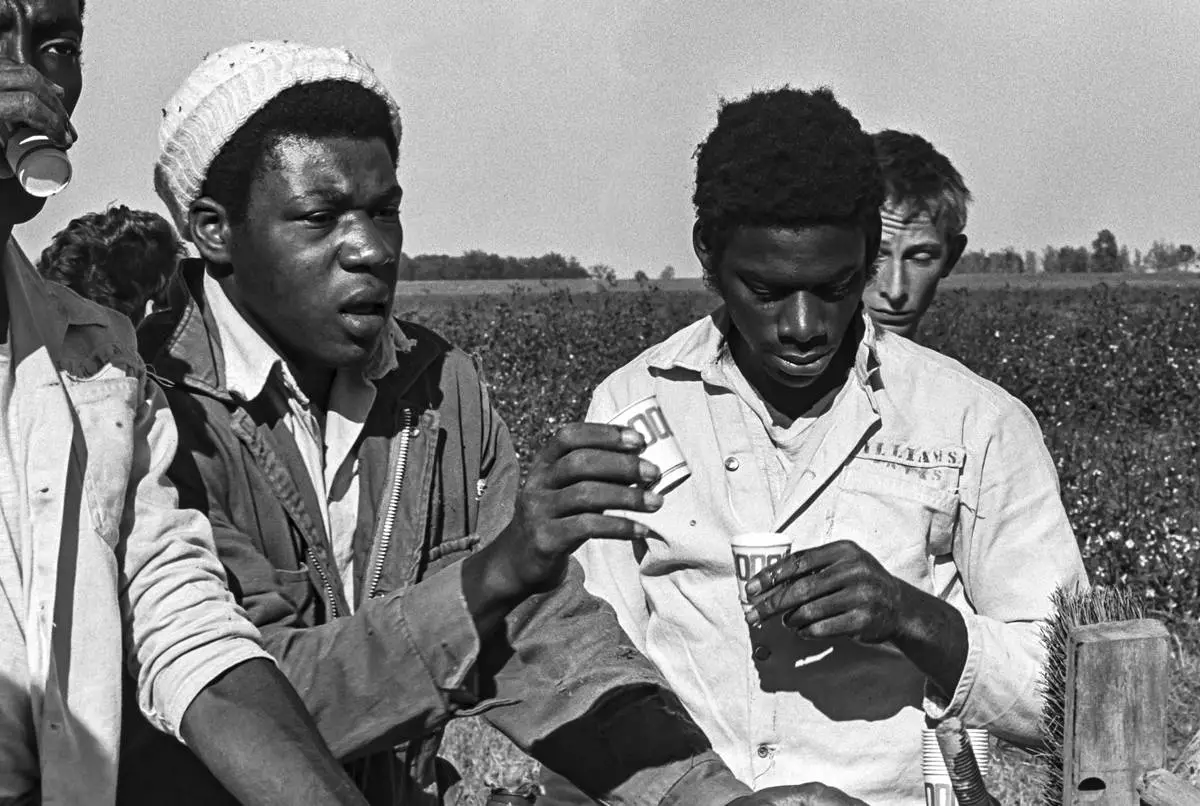
This 1975 photo shows prisoners at the Arkansas Department of Corrections Cummins Unit taking a water break while on work detail picking cotton in Grady, Ark. As daily temperatures hit record highs across much of the South, a federal judge has taken an unusual step, challenging the treatment of mostly Black incarcerated workers in the fields. (Bruce Jackson via AP)
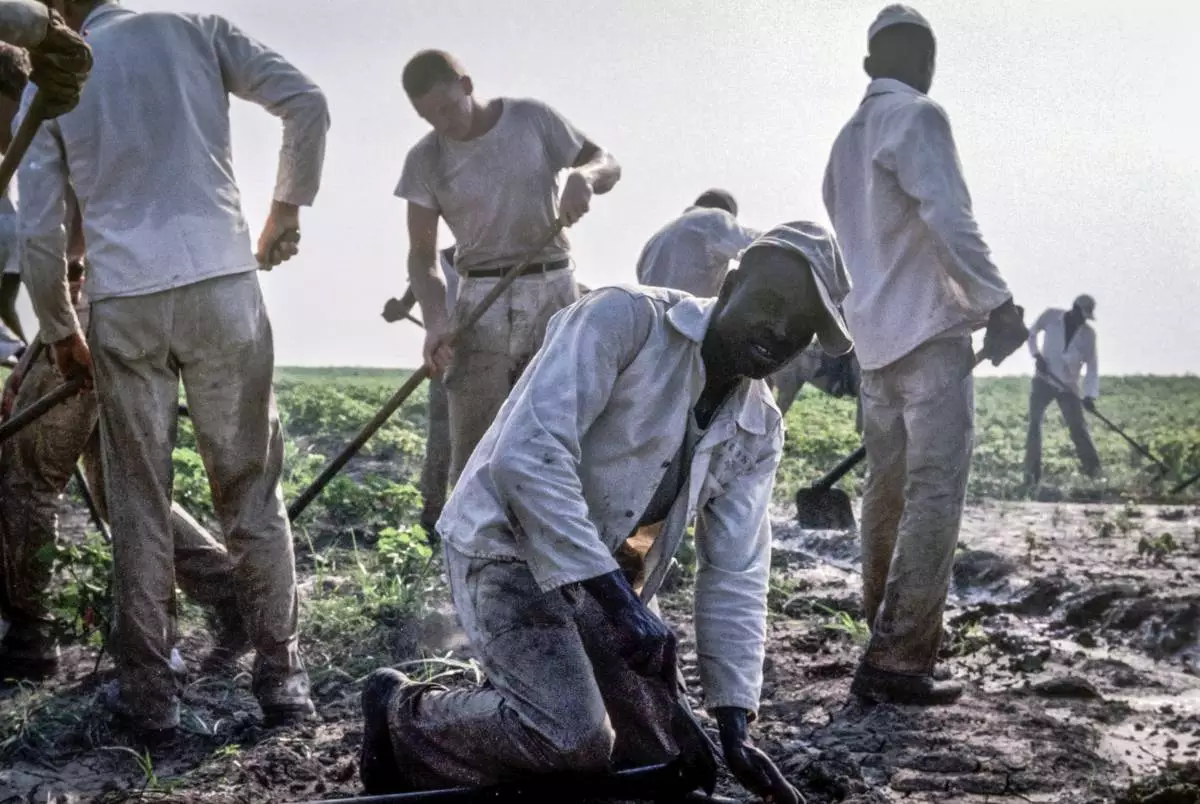
This 1972 photo shows prisoners at the Arkansas Department of Corrections Cummins Unit on work detail in the fields in Grady, Ark. As daily temperatures hit record highs across much of the South, a federal judge has taken an unusual step, challenging the treatment of mostly Black incarcerated workers in the fields. (Bruce Jackson via AP)
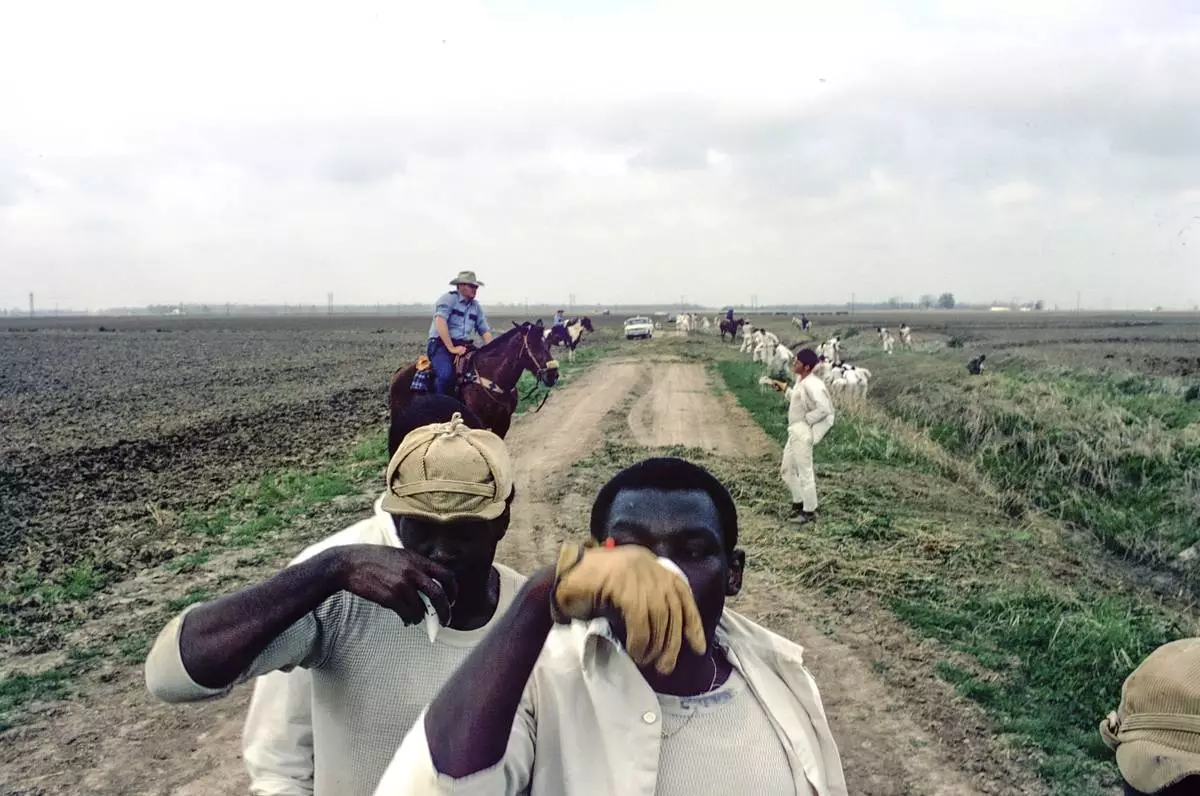
This 1974 photo shows prisoners at the Arkansas Department of Corrections Cummins Unit taking a water break while on work detail in the fields in Grady, Ark. As daily temperatures hit record highs across much of the South, a federal judge has taken an unusual step, challenging the treatment of mostly Black incarcerated workers in the fields. (Bruce Jackson via AP)
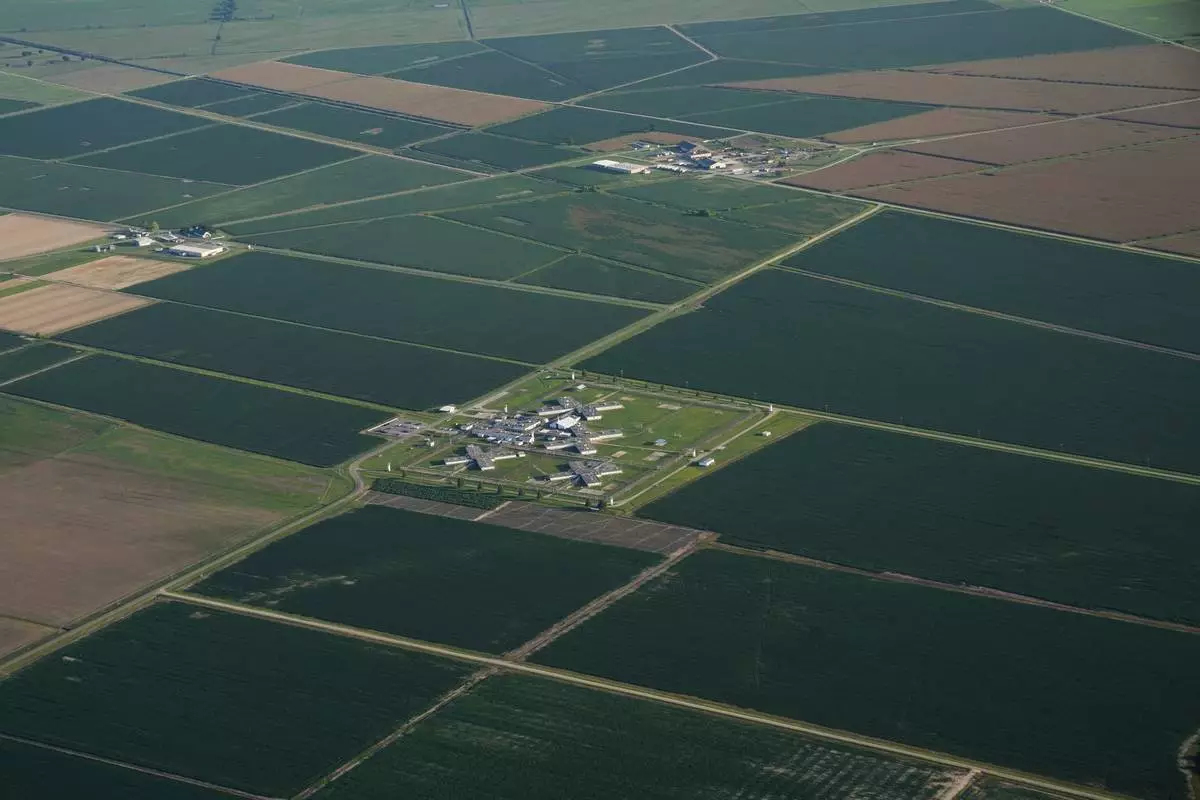
In this aerial photo, a cell block and agricultural fields on the grounds of the Louisiana State Penitentiary sit surrounded by agricultural land in Angola, La., Friday, July 21, 2023. America's largest maximum-security prison, known as Angola, sits on 18,000 acres where prisoners have toiled on the same farm lines as enslaved men and women since after emancipation often without shade, adequate work breaks or even sunscreen. In September, several incarcerated workers along with the New Orleans-based advocacy group Voice of the Experienced filed a class-action lawsuit calling for an end to the farm line, and accusing the state of cruel and unusual punishment. (AP Photo/Gerald Herbert)
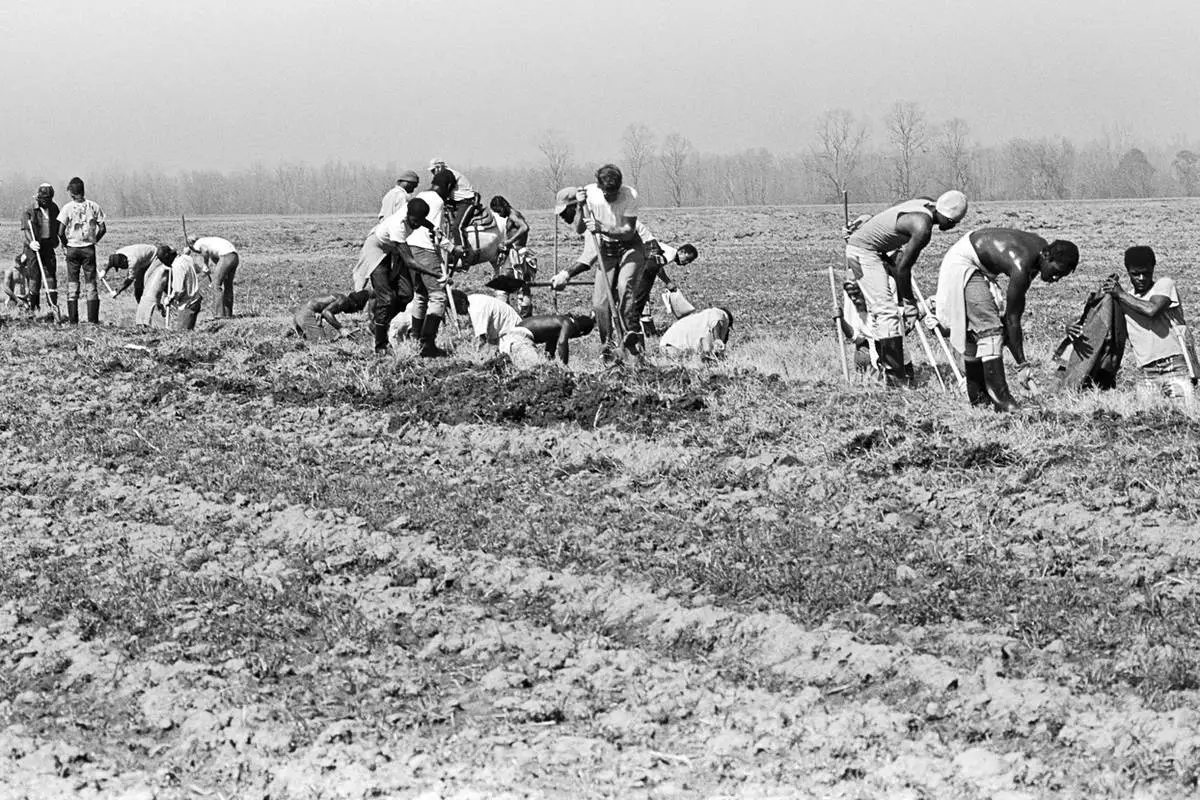
FILE - This 1980 photo shows prison laborers working in a field at the Louisiana State Penitentiary in Angola, La. In September, several incarcerated workers along with the New Orleans-based advocacy group Voice of the Experienced filed a class-action lawsuit calling for an end to the farm line, and accusing the state of cruel and unusual punishment. But as temperatures soared in May, the men asked the court in an emergency filing to stop work during extreme heat. (Keith Calhoun via AP, File)
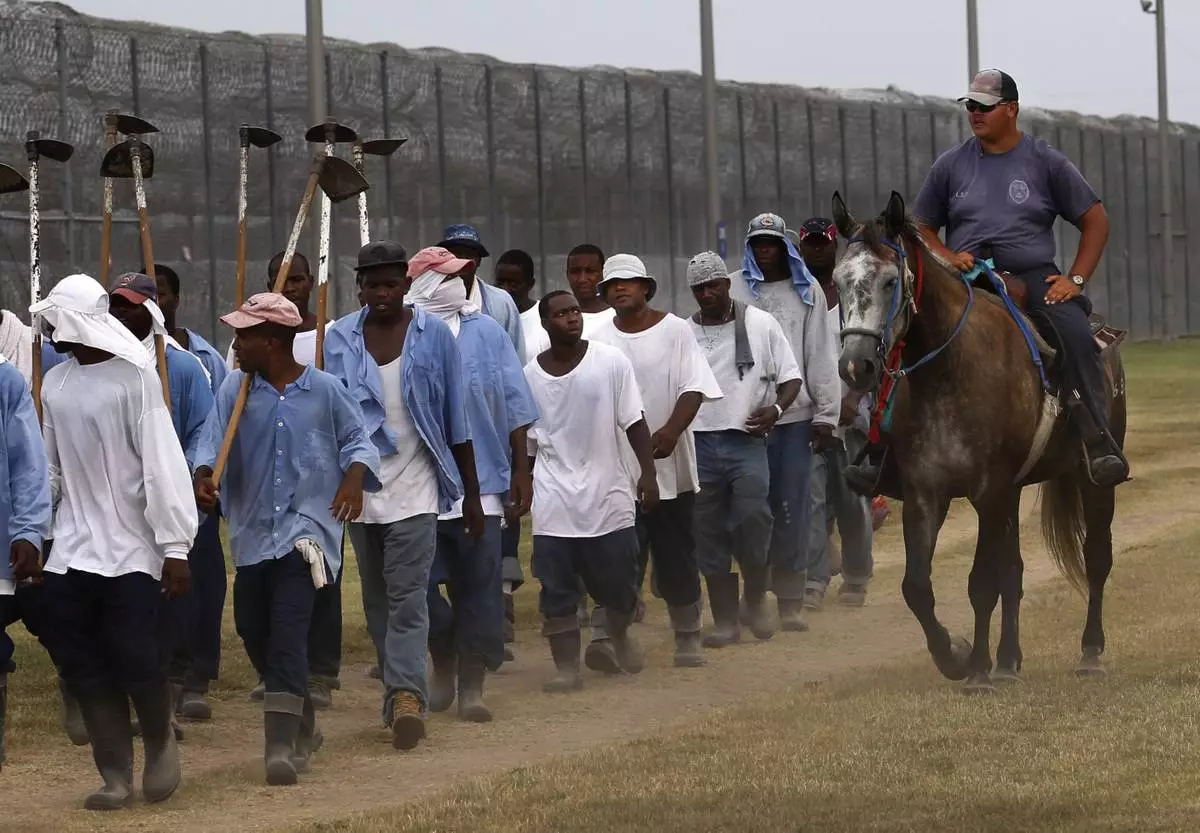
In this Aug. 18, 2011 photo, prison guards ride horses that were broken by inmates as they return from farm work detail at the Louisiana State Penitentiary in Angola, La. In September, several incarcerated workers along with the New Orleans-based advocacy group Voice of the Experienced filed a class-action lawsuit calling for an end to the farm line, and accusing the state of cruel and unusual punishment. But as temperatures soared in May, the men asked the court in an emergency filing to stop work during extreme heat. (AP Photo/Gerald Herbert)




















